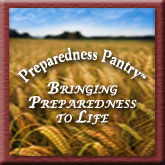I need to start with carrots. And the dehydrator. Being a baker, and not able to have anything sugar cane- or sugar beet-derived, I've been trying to work out a honey-sweetened cookie recipe that's actually sweet enough. Until I read Mary Bell's "Complete Dehydrator Cookbook", I wouldn't have thought of dehydrating, then powdering, carrots. But dehydrating concentrates the natural sugars in things, so dried carrots are very sweet. So I shredded, dried and then powdered some carrots (the bases of most blenders will accept a regular-sized canning jar, and a 1/2 pint jar, packed full, is the perfect size for powdering the carrots). You have to compensate for the added liquid when you substitute honey for sugar, but instead I just tossed in a couple of tablespoons of carrot powder. Worked like a dream -- nice and sweet, and just about the right amount of moisture! I've since tried this with yeast breads as well, with equally good results. And now that I have them on hand, I'm finding lots of other uses for the dried carrots (and dried celery, and tomatoes...) -- adding them to salad dressings, and to soups and sauces... I've even powdered some fruit leather (put in the freezer first), and put it into cookies. Didn't make the cookies taste "fruity" -- just added a pleasant sweetness, and a little extra moisture.
I've shredded & dried about 50# of carrots so far, ending up with 8 quarts, packed (large-mouth canning jars are great for storing). (Fruits & vegetables typically dry down to about 25% of their original weight & volume.) I'll probably do another 50# shredded (for powdering, or for rehydrating and using in various ways), and at least 50# in slices. Again, I'm trying to build up a supply of foods that can be stored unrefrigerated, that will sustain us in case of an emergency -- even one that lasts a while.
I'm also dehydrating cottage cheese. It was a pleasant surprise to realize that it's actually easier to use once it's dried. I figure it'll be good protein for us and our animal friends. The best buy, both price- and quality-wise, is a 5# tub available at a restaurant supply outlet. I paid about $6.50 for it the other day. I use the mesh dehydrator screens, and put it in tablespoonfuls -- it's easier to work with this way. Crumble it when it's dry. I've used it in spaghetti sauce, and, along with some chopped dried veggies, to jazz up cup-a-soups.
(Incidentally, I wondered what it will cost me to run my dehydrator, and did a little research -- you can find a calculator online. It's a 1,000 watt machine, if it's run at the highest heat setting, but I haven't used it at its hottest yet. If I did, it would cost just under $5 to run for 24 hours.)
As far as the grain mill, I've found it works best if I start on a medium grind setting (it has an adjustment dial, and is infinitely adjustable between very coarse and fine) and work my way to fine, putting it through several times. I could just put it through once and use the flour, and it would make perfectly fine (if a bit heavy) bread. But I want a lighter texture, so it's worth it to me to spend the extra time grinding -- particularly if I'm planning to share whatever I'm baking.
I've read a bit about how wonderful bread made with freshly ground flour is, and I was very eager to try my first loaf. But, so far, I've been disappointed. I don't think it's the flour, though -- it's either the baker or the recipes, or both. (Although I now understand what folks mean when they refer to the "bitterness" of bread made with flour that was ground awhile before the bread was made.) So I went out & invested in the new "Laurel's Kitchen Bread Book" (updated -- now has a bread machine section), and the Peter Reinhart tome that can only be described as a bread-baking textbook: "Peter Reinhart's Whole Grain Breads". I've baked from the former, and thoroughly enjoyed reading the latter -- and the next time I have a week or two to bake a loaf of bread (after first having stopped to set up an Excel spreadsheet -- which he actually recommends!!), I may try his method. Actually, he gives such a promising description of bread baked using his (rather involved) method, that I might try it anyway. Just gotta figure out how to babysit the starter for the first couple of weeks while working full time...
Another happy discovery was that the powdered eggs I purchased for our emergency food storage dramatically expand the kinds of bread that I can bake on the delayed cycle in my bread machine. Normally, breads that contain milk or eggs have to be mixed and baked right away. But it's lovely to be able to put the ingredients into the machine and program it to be ready when we get up the next morning (or when we get home after work...)
Next Time...
My next adventure will be pressure canning. That will allow me to make and store some soups, maybe a few chicken dishes... Should be an excellent way to expand our food storage options...






No comments:
Post a Comment